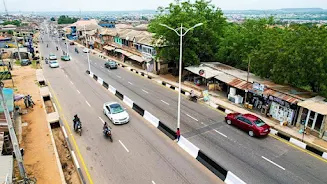Lagos enhances land administration process.
As part of the strategy to enhance seamless and integrated land administration processes, the Lagos State Government has introduced the ‘Aumentum’ Land Administration – Automation process.
The Permanent Secretary, Lands Bureau, Mr. Kamar Olowoshago, said this in a statement.
Olowoshago explained that the Aumentum Solution as a digitized process, allows government to automate Land record management and facilitates the registration of property transactions in a more chronological, controlled and transparent manner.
He pointed out that the digital invention simplifies the way the state government manages Land information and Property tax revenue.
According to the Permanent Secretary, “the State Government has joined the league of global pacesetters by complying with a technology- driven Land administration process.”
He affirmed that by deploying the Aumentum Land Administration solution as a reliable tool to customize and streamline its business workflow process, the state is assured of higher productivity, enhanced revenue generation, security of documents, improved and smarter customer-service delivery.
Stating that the Bureau has entrenched a culture of excellence with prompt technology-driven and efficient customer-centric service delivery, the Permanent Secretary acknowledged that ‘Land Administration in Lagos State has transversed over several decades and stages in its journey towards integrating technology that is all encompassing and sustainable.”
He traced the trajectory from the implementation of the Electronic Document Management System (EDMS) in 2013 to the electronic Certificate of occupancy in 2014 and then to the integrated Land Administration- Automation process introduced in 2019. He noted that land administration in the state has evolved to provide unsurmountable standard in land management across the nation.
He lauded the administration of Babajide Sanwo Olu for taking bold steps in this regard.
“ Thanks to Mr. Governor, our processes which were cumbersome and time consuming before the automation have now become more efficient and cost effective.
“Formerly, directorates operated in silos with operation of the open filling system which exposed documents to insecurity, forgery and other forms of mismanagement,” he said.
Olowoshago further explained that the transformation involves the movement of files from the three main directorate repositories to the digitization project campus, preliminary sorting of files into government schemes and private properties, sorting of private property file into transaction files across 20 local government areas of the state, merging of ‘root title’ processing files with subsequent transaction as encumbered and unbinding of Titles and Deeds from registered volumes for chronological sorting.
Other aspects of the process, he said, includes merging of titles with subsequent Deeds and pre-requisite merged files, encapsulated into property folders as authenticated by the Registrar of Titles, dispatch of authenticated property folders to Technical partners for Digitization and automation; and receipt of digitized, concluded property folders for archival in designated locations.
He added that to speed up the digitisation process, the Bureau engaged about a hundred ad-hoc Staff to discharge the enormous assignment of transforming manual documents which initially existed in disjointed silos into digital forms.
“These team of highly talented and skilled youths have over time also assisted in actualizing the hybrid GO-LIVE to meet the dire need of our esteemed customers on stipulated timelines,” he said .
Olowoshago said that the herculean transformation of manual paper documentation and archival of records has over the period under review transited and metamorphosed into a digital workflow machine, encapsulating and streamlining Property documents for improved customer-service delivery experience and enhanced revenue generation.
Appraising the relevance of adopting ‘Aumentum’ to Land Administration, the Permanent Secretary further said that the new automation system which provides a powerful solution that can be easily customized for any land- related business process has simultaneously transformed over 250 parcels of land in Lagos Metropolis with historical transactional records from paper forms through an herculean manual process to digital form, adding that the transaction turn-around time was shortened thereby reducing operational costs.
Pointing out some key features of the Automated business process, Olowoshago stated that the service which can be accessed via: landonline.lagos.gov.ng is designed to provide a secure shopping cart experience with data analysis that will give customers opportunity to track application progress, make comments and receive immediate feedbacks on complaints.
“The introduction of the digital automated process has also encouraged collaboration and content- sharing within Government Agencies by the creation of a One-Stop-Shop enquiry to facilitate unhindered access and an end-to-end- Land Administration platform that is sustainable and productive thereby reducing the silos of information existing across Ministries, Departments and Agencies,” he said.
While confirming that the technological leap is in compliance with Government’s Agenda of “Making Lagos a 21st Century Economy” the Permanent Secretary, emphasized that the new system will support the compartmentalisation of the Bureau business processes and reduce human interface.


.jpg)





.jpg)